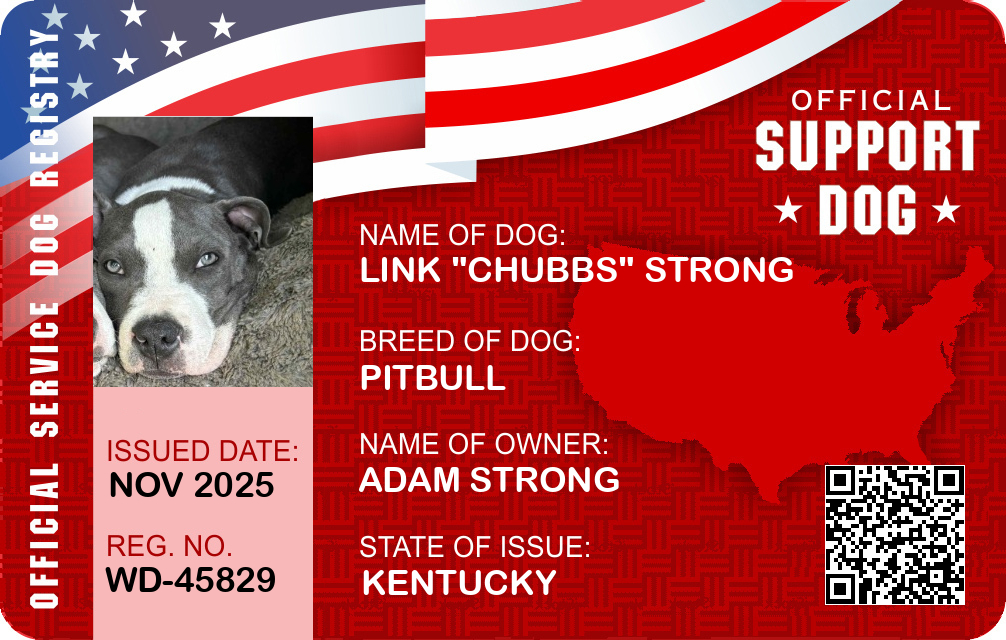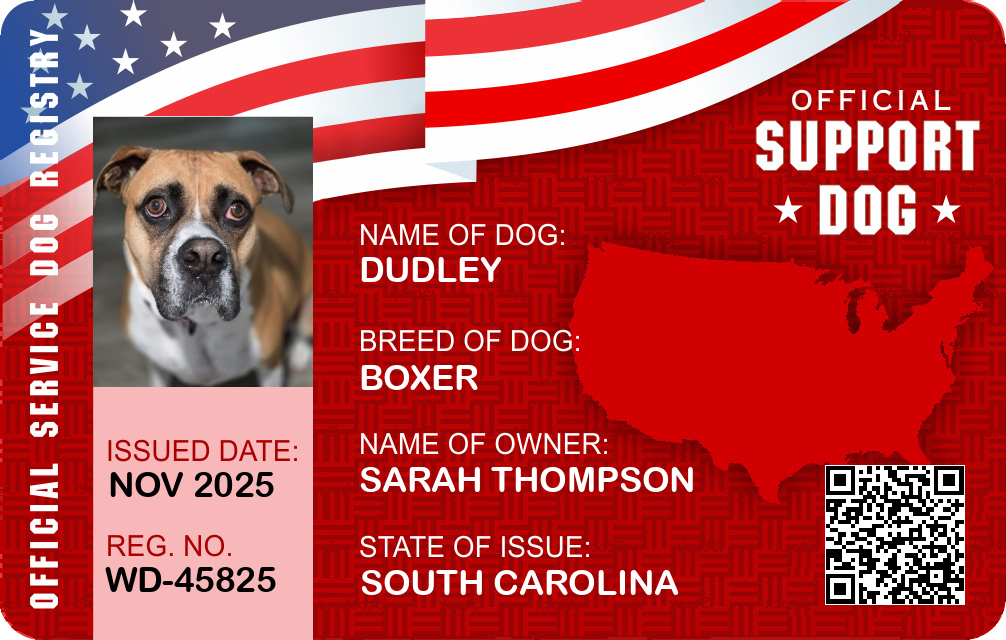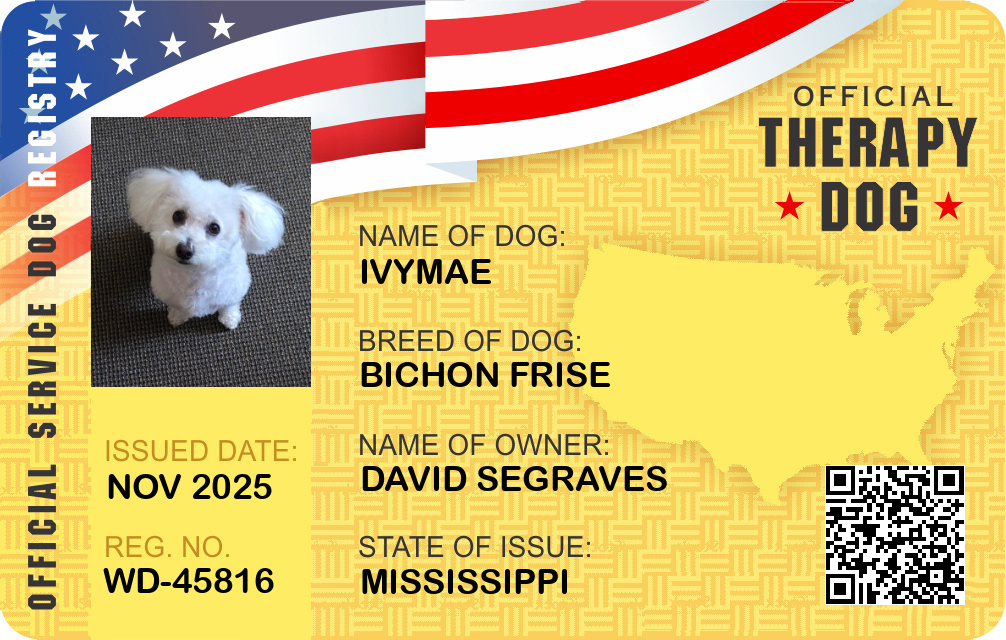Wyoming Emotional Support Animal Laws

Overview of ESAs and Legal Definitions in Wyoming
What is an Emotional Support Animal?
An Emotional Support Animal (ESA) is a type of assistance animal that provides therapeutic benefit to an individual with a mental or emotional disability. Unlike service animals, ESAs are not required to be trained to perform specific tasks but instead offer comfort and support through their presence. In Wyoming, as in other states, ESAs can be any type of animal, as long as they are prescribed by a licensed mental health professional.
How ESAs Differ from Service Animals
In Wyoming, as defined under federal law, service animals are specifically dogs that are individually trained to perform tasks for individuals with physical, sensory, psychiatric, intellectual, or other mental disabilities. These tasks directly relate to a person’s disability. In contrast, ESAs do not require specialized training, and they do not have the same public access rights as service animals. The primary purpose of an ESA is to provide emotional comfort and companionship through its presence alone.
Key Federal Laws Affecting ESAs (e.g., FHA, ACAA)
Key federal laws significantly impact the rights of ESA owners, both in Wyoming and beyond. The Fair Housing Act (FHA) is a pivotal federal law that prevents discrimination in housing based on disability and requires housing providers to make reasonable accommodations for ESAs. This law mandates that individuals with ESAs are allowed to live with their animals, regardless of a building’s pet policy, as long as the proper documentation is provided.
The Air Carrier Access Act (ACAA), however, has been revised over the years, significantly limiting the rights previously extended to ESAs. Currently, ESAs are not recognized under the ACAA, and they are treated as pets rather than service animals. This means airlines may impose size, weight, and breed restrictions, and may charge additional fees when ESAs travel in the cabin or cargo hold.
State-Specific ESA Laws in Wyoming
Housing Rights and Responsibilities
In Wyoming, ESA owners are protected under the federal Fair Housing Act, which mandates reasonable accommodation from landlords regarding housing. Landlords cannot charge pet fees or deposits for ESAs, nor can they create undue restrictions on weight or breed of the ESA. However, ESA owners in Wyoming must provide a legitimate ESA letter from a licensed mental health professional, establishing the necessity of the animal for their mental health.
Landlords in Wyoming have the right to request this documentation but cannot require detailed medical information. Furthermore, ESAs must adhere to basic standards of behavior; if an ESA poses a threat to the safety or property of others, landlords might refuse accommodation.
Public Access and Accommodation
Wyoming does not have specific laws granting public access to ESAs in the same way service animals are accommodated. Under both state and federal laws, ESAs do not enjoy the same privileges as service animals for public transport, restaurants, or other public settings. Their access remains restricted to housing accommodations and specific travel-related considerations if explicitly stated by the travel provider.
Transportation and Travel Rules
Though federal laws like the ACAA are more restrictive towards ESA travel compared to previous regulations, ESA owners in Wyoming can still negotiate travel accommodations privately with transportation providers. While ESAs might not automatically gain access to cabins on airplanes for free, transportation companies cannot discriminatorily prevent them from traveling unless specific space issues or safety concerns arise.
Employment and Workplace Considerations
ESAs are not entitled to access in workplaces under the Americans with Disabilities Act (ADA), and Wyoming aligns with this federal law. Employers may, however, implement their own policies allowing ESAs on a case-by-case basis, primarily when an employee can demonstrate a direct benefit from having the ESA at work. Open communication with employers about the need for an ESA is crucial, and requests are less likely to be accommodated without evidence of necessity.
Documentation, Requirements, and Processes in Wyoming
ESA Letters and Who Can Issue Them
In Wyoming, an ESA letter is required to secure the benefits and allowances granted to ESA owners, specifically for housing rights. These letters must be is
Register Your Dog Instantly
sued by licensed mental health professionals, which can include psychologists, psychiatrists, clinical social workers, or other qualified therapists. The letter should clearly state the professional’s opinion on the need for an ESA due to the individual’s disability.Registration, Certifications, and Common Misconceptions
There is no mandatory ESA registration or certification required by law, either federally or in Wyoming. Websites offering ESA “registrations” or “certifications” should be approached with caution, as these documents hold no legal value. Instead, the only documentation that holds weight is a legitimate ESA letter from a licensed mental health professional.
Landlord, Business, and Provider Verification Rules
Landlords or housing providers in Wyoming have the right to verify the legitimacy of an ESA letter but cannot demand medical records or detailed treatment information. Businesses do not need to accommodate ESAs but must respect tenants’ rights in housing settings. It's essential for ESA owners to understand what verification entails to avoid misunderstandings or violations of privacy in the process.
Rights, Limitations, and Legal Risks
Rights ESA Owners Have in Wyoming
ESA owners in Wyoming have specific rights, particularly in the realm of housing, fortified by the FHA. They can keep their ESA in their home without incurring pet fees and are protected from discriminatory eviction based on a no-pets policy.
Limits on ESA Protections and Common Restrictions
The limitations of ESA protections in Wyoming reflect a broader federal stance, where ESAs are not granted access to public spaces or accommodations, unlike service animals. They may face restricted access in public transport, restaurants, grocery stores, and hotels. It’s important for ESA owners to be aware of these limitations to mitigate misunderstandings.
Penalties for Fraud or Misrepresentation
Falsely representing a pet as an ESA can lead to significant penalties. Although Wyoming currently does not impose harsh penalties specifically, misrepresentation can undermine the credibility of necessary service animal regulation and create hurdles for genuine ESA owners. Broader implications can include eviction, loss of employment, or financial penalties under federal statutes.
Practical Guidance for ESA Owners in Wyoming
How to Qualify for an ESA Legitimately
To qualify for an ESA in Wyoming, individuals must be evaluated by a licensed mental health professional who can assess whether an ESA is necessary for their emotional or mental disability. Obtaining a legitimate ESA letter is the foremost step, revolving around genuine need rather than convenience or preference.
How to Talk to Landlords, Airlines, and Employers
Clear, factual conversations are vital when discussing ESAs with landlords, airlines, and employers. Providing documentation upfront and explaining needs without overly detailed personal disclosures helps assert rights efficiently. For airlines, early communication before flying can elucidate any requirements or measures needed for accommodation.
Tips for Avoiding Scams and Legal Problems
Avoid undue financial expenditures on unnecessary ESA registrations or certifications that are sold online. When sought documentation aligns strictly with legal ESA letters, issues can be minimized. ESA owners should seek advice from legal experts when they face complex challenges or potential legal disputes to avoid scams and further complications.
Summary of ESA Laws in Wyoming
- ESA owners are entitled to housing rights under the FHA, but landlords can request an ESA letter from a licensed professional.
- Public spaces and travel rights for ESAs are limited, with no guaranteed accommodation outside of housing.
- There is no federal or state law requiring ESA registration or certification beyond an ESA letter.
- Penalties exist for fraudulent representation of an ESA, aligning with broader ethical and legal standards to ensure fairness.
- Genuine need and proper documentation are pivotal to obtaining ESA status, with licensed mental health professionals as the certifying authority.
- Effective communication with stakeholders like landlords, airlines, and employers helps safeguard rights and encourage cooperation.











